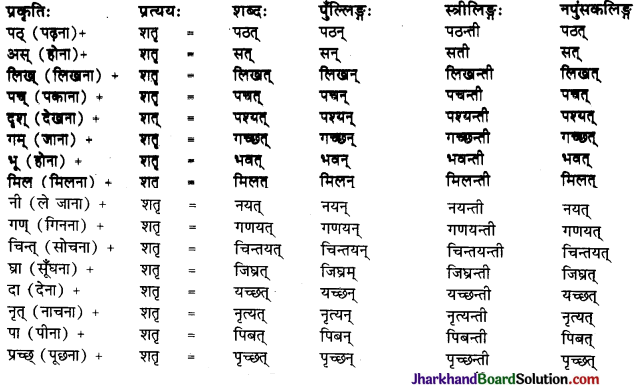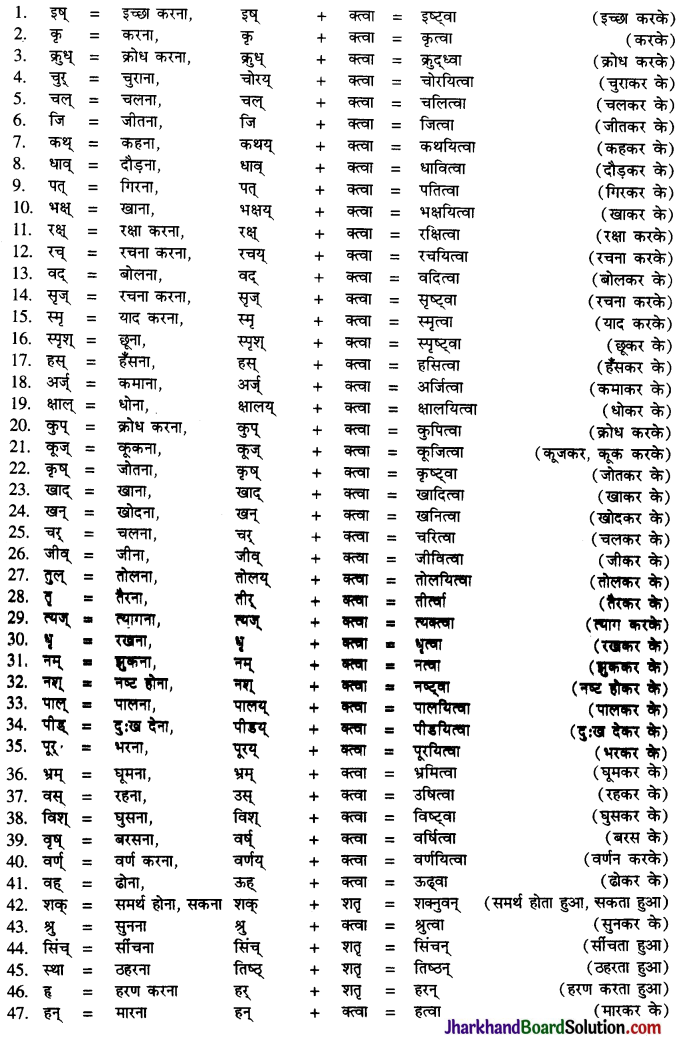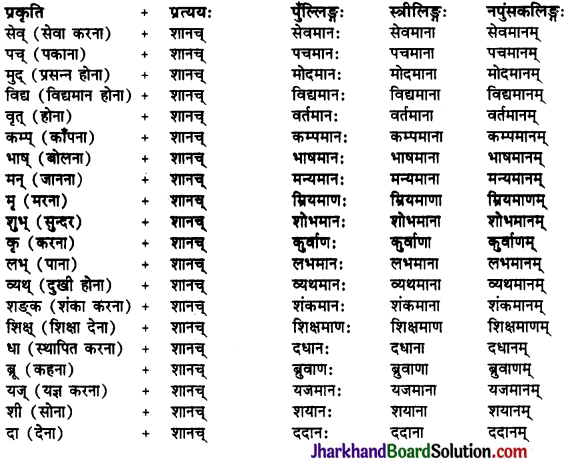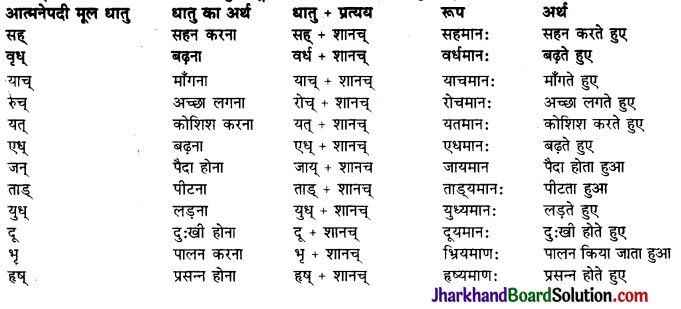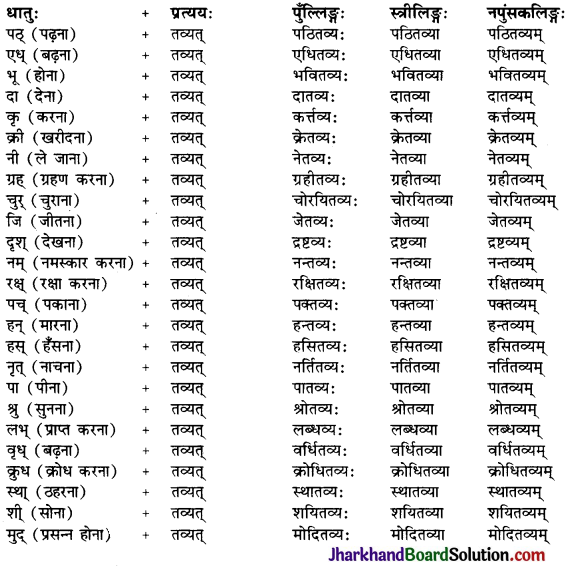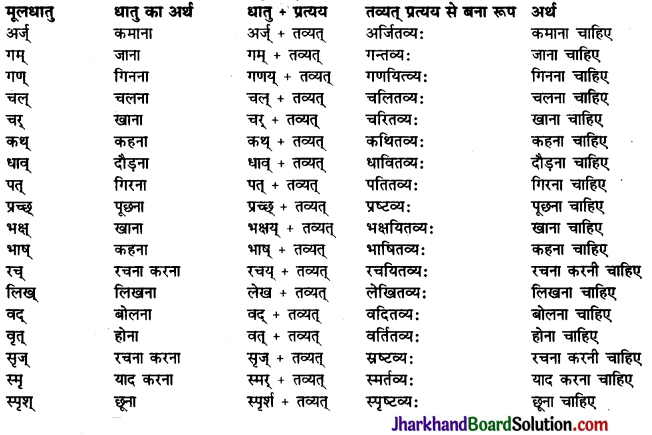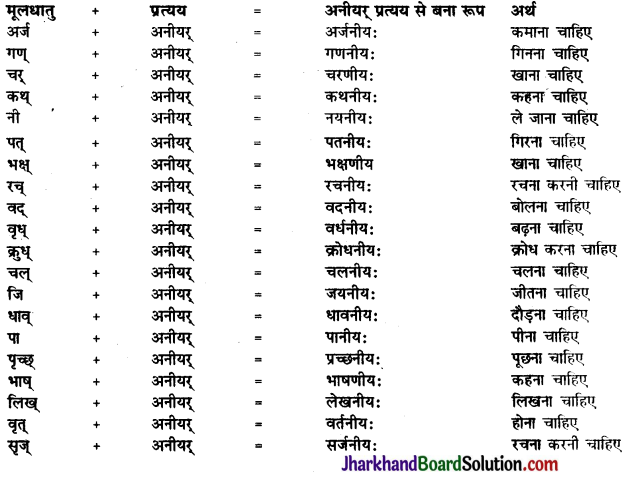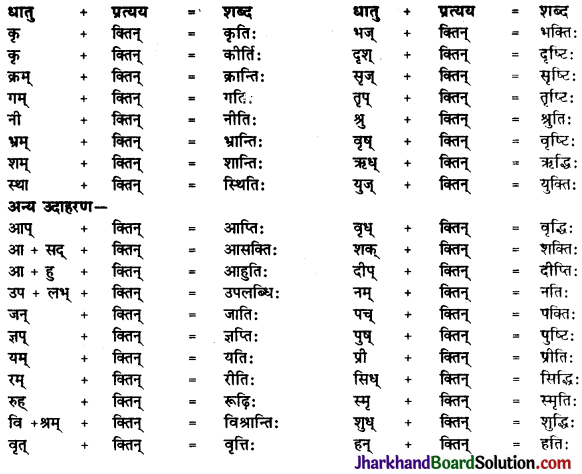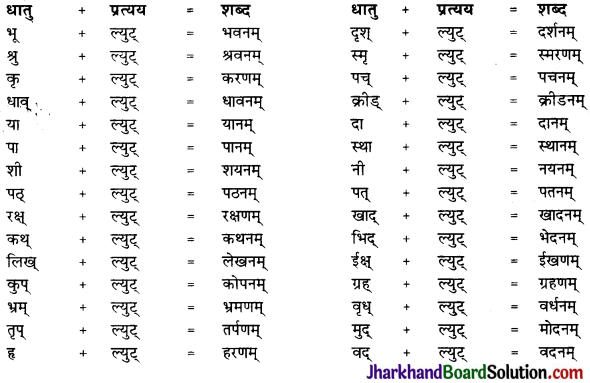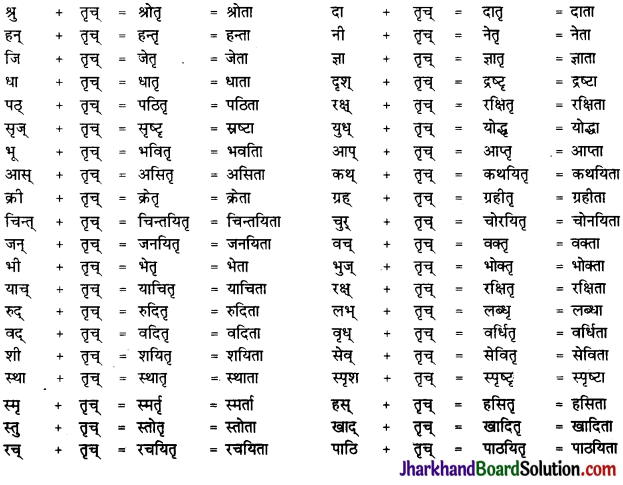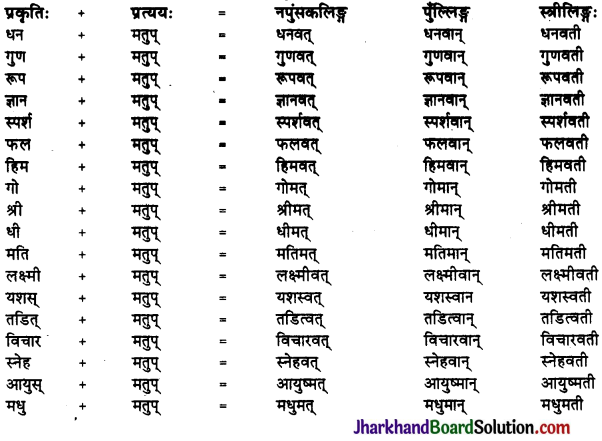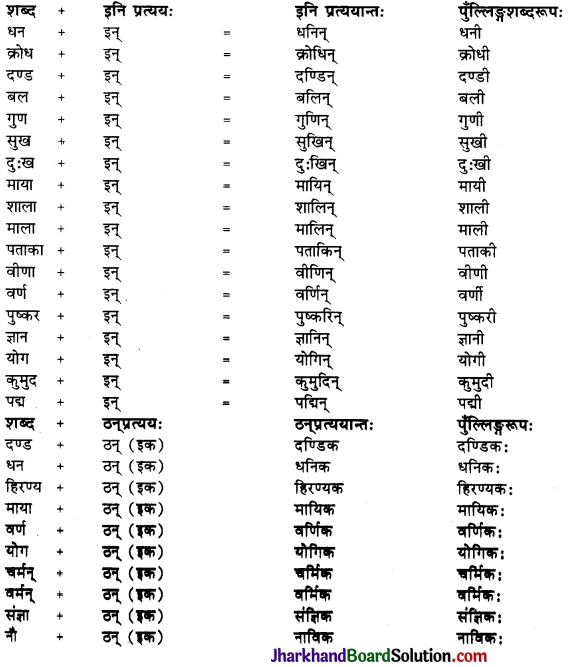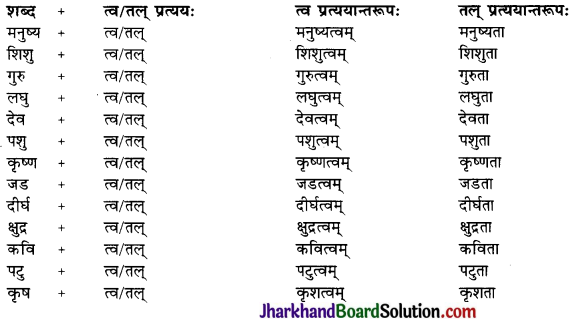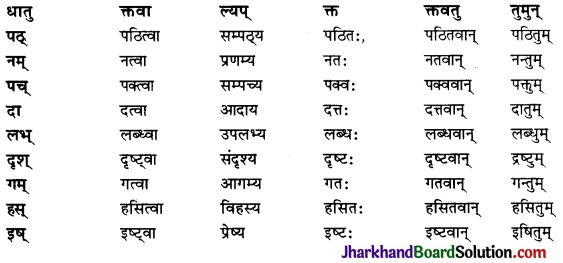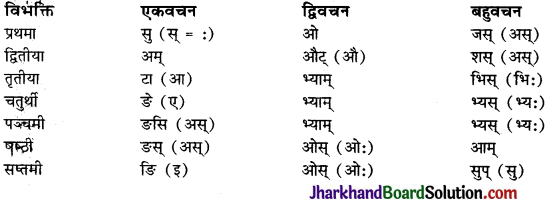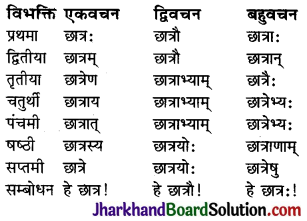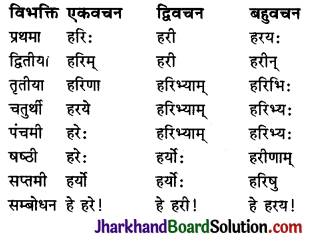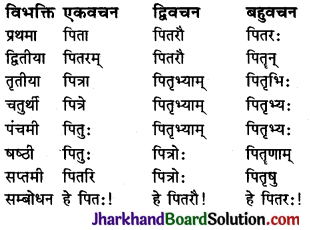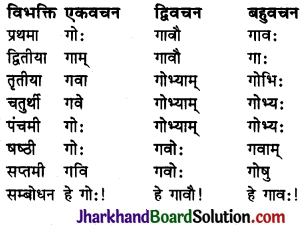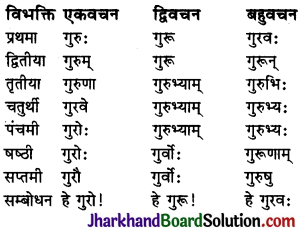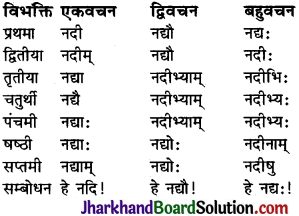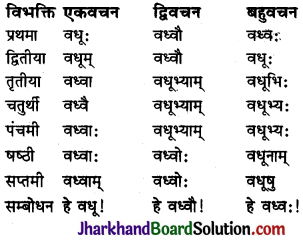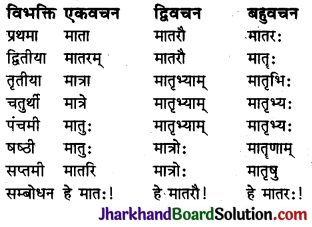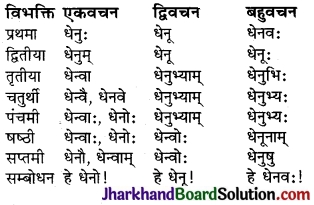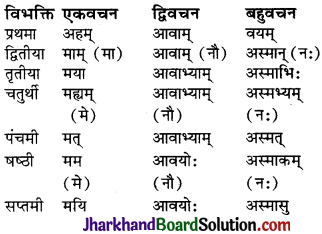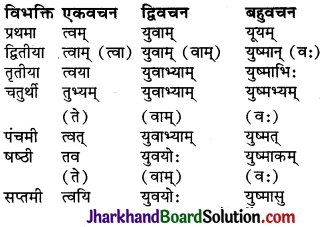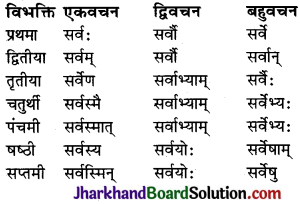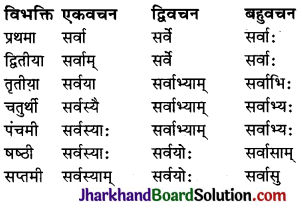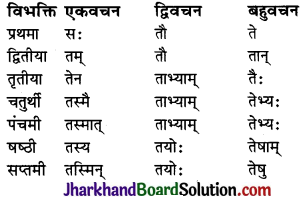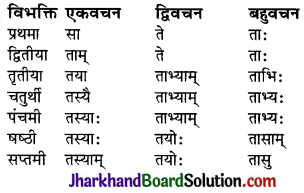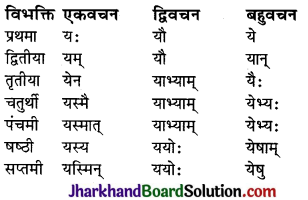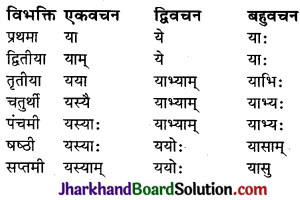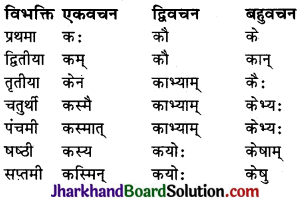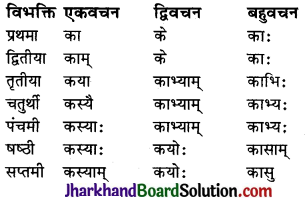Jharkhand Board JAC Class 11 Geography Important Questions Chapter 10 वायुमंडलीय परिसंचरण तथा मौसम प्रणालियाँ Important Questions and Answers.
JAC Board Class 11 Geography Important Questions Chapter 10 वायुमंडलीय परिसंचरण तथा मौसम प्रणालियाँ
बहु-विकल्पी प्रश्न (Multiple Choice Questions)
दिए गए चार वैकल्पिक उत्तरों में से सही उत्तर चुनिए
1. सामान्य वायुदाब कितना होता है?
(A) 34 मिलीबार
(B) 300 मिलीबार
(C) 1013 मिलीबार
(D) 900 मिलीबार।
उत्तर:
(C) 1013 मिलीबार।
2. भूमध्य रेखीय खण्ड में निम्न वायुदाब पेटी का मुख्य कारण क्या है?
(A) दैनिक गति
(B) चक्रवात
(C) समुद्री धाराएं
(D) संवाहिक धाराएं।
उत्तर:
(D) संवाहिक धाराएं।
3. उपध्रुवीय क्षेत्र में निम्न वायु दाब का मुख्य कारण क्या है?
(A) दैनिक गति
(B) उच्च तापमान
(C) संवाहिक धाराएं
(D) चक्रवात।
उत्तर:
(A) दैनिक गति।
![]()
4. डोलड्रमज़ किस क्षेत्र को कहा जाता है?
(A) भू-मध्य रेखीय क्षेत्र
(B) ध्रुवीय क्षेत्र
(C) शीत ऊष्ण कटिबन्ध क्षेत्र
(D) शीत कटिबन्ध क्षेत्र।
उत्तर:
(C) भू-मध्य रेखीय क्षेत्र।
5. उत्तरी गोलार्द्ध में व्यापारिक पवनों की दिशा क्या होती है?
(A) उत्तर-पूर्वी
(B) दक्षिण-पूर्वी
(C) पश्चिमी
(D) दक्षिणी।
उत्तर:
(A) उत्तर-पूर्वी।
6. वायुदाब निम्नतम होता है जब वायु
(A) उष्ण तथा आर्द्र होती है
(B) ठण्डी तथा शुष्क होती है
(C) उष्ण तथा शुष्क होती है
(D) ठण्डी तथा आर्द्र होती है।
उत्तर:
(A) उष्ण और आर्द्र होती है।
7. वायुमण्डलीय दाब के मापन के लिए इकाई होती है:
(A) वार
(B) मिलीबार
(C) कैलोरी
(D) मीटर।
उत्तर:
(B) मिलीबार।
8. ऊंचाई के बढ़ने के साथ वायुदाब तथा तापमान में क्या अन्तर आता है?
(A) दोनों कम होते जाते हैं
(B) दोनों बढ़ते जाते हैं
(C) दोनों स्थाई रहते हैं।
(D) वायुदाब कम और तापमान बढ़ने लगता है।
उत्तर:
(A) दोनों कम होते जाते हैं।
9. पवन का वेग मापने के लिए उपयोग किया जाता है:
(A) हाइग्रोमीटर
(B) एनिमोमीटर
(C) बैरोमीटर
(D) थर्मामीटर।
उत्तर:
(B) एनिमोमीटर।
![]()
10. घोड़ों के अक्षांश भूगोलिक नाम है-
(A) उत्तरी उपोष्णीय उच्च वायु दाब कटिबन्ध का
(B) विषुवतरेखीय निम्न वायुदाब कटिबन्ध का
(C) विषुवतरेखीय शान्त मण्डल का
(D) ध्रुवीय क्षेत्रों का ।
उत्तर:
(A) उत्तरी उपोष्णीय उच्च वायु दाब कटिबन्ध का।
11. चिनूक पवनें किन पर्वतों के पूर्वी ढलानों से उतरती हैं?
(A) हिमालय
(B) एंडीज
(C) रॉकीज
(D) आल्पस।
उत्तर:
(C) रॉकीज।
अति लघु उत्तरीय प्रश्न (Very Short Answer Type Questions)
प्रश्न 1.
वायुमण्डलीय दाब में भिन्नता का क्या कारण है?
उत्तर:
वायु गर्म होने पर फैलती है और ठण्डा होने पर सिकुड़ती है। इससे वायुमण्डलीय दाब में भिन्नता आती है। परिणामस्वरूप वायु गतिमान होकर अधिक दाब वाले क्षेत्रों से न्यून दाब वाले क्षेत्रों में प्रवाहित होती है। क्षैतिज गतिमान वायु ही पवन है।
प्रश्न 2.
वायुमण्डलीय दाब के क्या प्रभाव हैं?
उत्तर:
वायुमण्डलीय दाब यह निर्धारित करता है कि कब वायु ऊपर उठेगी व कब नीचे बैठेगी। पवनें पृथ्वी पर तापमान व आर्द्रता का पुनर्वितरण करती हैं जिससे पूरी पृथ्वी का तापमान स्थिर बना रहता है। ऊपर उठती हुई वायु का तापमान कम होता जाता है। बादल बनते हैं और वर्षा होती है जैसे हम ऊपर ऊंचाई पर चढ़ते हैं, वायु विरल होती जाती है और सांस लेने में कठिनाई होती है।
प्रश्न 3.
वायुमण्डल का सामान्य परिसंचरण किन बातों पर निर्भर करता है?
उत्तर:
वायुमण्डल का सामान्य परिसंचरण: भूमण्डलीय पवनों का प्रारूप मुख्यतः निम्न बातों पर निर्भर है
- वायुमण्डलीय ताप में अक्षांशीय भिन्नता,
- वायुदाब पट्टियों की उपस्थिति,
- वायुदाब पट्टियों का सौर किरणों के साथ विस्थापन,
- महासागरों व महाद्वीपों का वितरण तथां
- पृथ्वी का घूर्णन। वायुमण्डलीय पवनों के प्रवाह प्रारूप को वायुमण्डलीय सामान्य परिसंचरण भी कहा जाता है। यह वायुमण्डलीय परिसंचरण महासागरीय जल को भी गतिमान करता है, जो पृथ्वी की जलवायु को प्रभावित करता है।
लघु उत्तरीय प्रश्न (Short Answer Type Questions)
प्रश्न 1.
वायुमण्डलीय दाब से क्या अभिप्राय है?
उत्तर:
वायुमण्डलीय दाब (Atmospheric Pressure ):
वायुमण्डल पृथ्वी के धरातल पर पृथ्वी की गुरुत्वाकर्षण शक्ति के कारण टिका है। गुरुत्वाकर्षण शक्ति के कारण प्रत्येक वस्तु में भार होता है। वायु में भी एक घनफुट में 1.2 . औंस भार होता है। इस भार के कारण पृथ्वी के धरातल पर दबाव पड़ता है। वायुमण्डलीय दाब का अर्थ है किसी भी स्थान पर वहां की हवा की उच्चतम सीमा के स्तम्भ का भार।
![]()
प्रश्न 2.
‘वाताग्र’ कैसे बनते हैं?
उत्तर:
जहां दो भिन्न वायुराशियां (शीत व उष्ण) वायुराशियां परस्पर टकराती हैं, तो उसे वायुराशि का वाताग्र कहते हैं। वाताग्र न तो धरातलीय सतह के सामान्तर होता है और न ही उस पर लम्बवत् होता है बल्कि कुछ कोण पर झुका होता है।
प्रश्न 2.
सामान्य वायु दाब किसे कहते हैं?
उत्तर:
सामान्य वायु दाब (Normal Atmosphere Pressure ): समुद्र तल पर प्रति वर्ग इंच पर वायुमण्डल का दबाव 6.68 किलोग्राम या 1.03 किलोग्राम प्रति वर्ग सेंटीमीटर होता है। वायुमण्डल का औसत या सामान्य दाब 45° अक्षांश पर समुद्र तल पर 29.92 इंच या 76 सेंटीमीटर या 1013.2 मिलीबार होता है।
प्रश्न 3.
एक मिलीबार से क्या अभिप्राय है? वायुदाब की माप इकाइयों में क्या सम्बन्ध है?
उत्तर:
एक वर्ग से०मी० पर एक ग्राम भार के बल को एक मिलीबार कहते हैं। दूसरे शब्दों में 1000 डाइन (Dynes) प्रति वर्ग से०मी० के वायु भार को एक मिलीबार कहते हैं। 1000 मिली बार के वायुभार को एक बार (Bar) कहते हैं। विभिन्न माप इकाइयों में सम्बन्ध:
30 इंच वायुदाब = 76 से०मी० = 1013.2 मिलीबार
1 इंच वायुदाब = 34 मिलीबार
1 से०मी० वायु दाब = 13.3 मिलीबार
प्रश्न 4.
दाब प्रवणता (Pressure Gradient) को परिभाषित करें
उत्तर:
वायुदाब का वितरण समदाब रेखाओं द्वारा प्रदर्शित किया जाता है। समदाब रेखाओं के अन्तर को दाब प्रवणता कहते हैं। यह दो समदाब रेखाओं पर समकोण बनाती हुई होती है। यह दाब प्रवणता वायु दिशा तथा वायु वेग को प्रदर्शित करती है। यदि समदाब रेखाएं एक-दूसरे के निकट हों तो दाब प्रवणता तीव्र होती है तथा तेज़ पवनें चलती हैं। यदि समदाब रेखाएं दूर-दूर हों तो वायु की गति मन्द होती है।
![]()
प्रश्न 5.
ऊँचाई के साथ वायु दाब में कमी क्यों होती है?
उत्तर:
ऊँचाई के साथ साथ 34 मिलीबार प्रति 300 मीटर की दर से वायुदाब कम होता है। इस कमी का मुख्य कारण वायु का घनत्व तथा सम्पीड़न क्रिया है। वायुमण्डल की ऊपरी परतें हल्की होती हैं। ऊपरी परतों के बोझ तथा दबाव के कारण नीचे की परतों पर सम्पीड़न क्रिया होती है इसलिए धरातल के निकट की परतों में वायुदाब अधिक होता है।
निश्चित ऊँचाई पर मानक तापमान व वायुदाब
| स्तर | वायुदाब (mle) | समुद्रतल |
| समुद्रतल | 1013.25 | 15.2 |
| 1 कि०मी० | 898.76 | 8.7 |
| 5 कि०मी० | 540.48 | – 17.3 |
| 10 कि०मी० | 265.00 | -49.7 |
प्रश्न 6.
कॉरिऑलिस प्रभाव किस प्रकार पवन की दिशा प्रभावित करता है?
उत्तर:
व्यापारिक पवनों की दिशा पर कॉरिऑलिस शक्ति का प्रभाव पड़ता है। उत्तरी गोलार्द्ध में इन पवनों की दिशा उत्तर-दक्षिण की अपेक्षा उत्तर-पूर्व हो जाती है। दैनिक गति के कारण उत्पन्न कॉरिऑलिस प्रभाव से इन पवनों की दिशा उत्तरी गोलार्द्ध में दाईं ओर तथा दक्षिणी गोलार्द्ध में बाईं ओर मुड़ जाती है।
प्रश्न 7.
वाताग्र के विभिन्न प्रकार बताओ।
उत्तर:
वाताग्र (Fronts ): जब दो भिन्न प्रकार की वायुराशियाँ मिलती हैं तो उनके मध्य सीमा क्षेत्र को वाताग्र कहते हैं। वाताग्रों के बनने की प्रक्रिया को वाताग्र जनन (Frontogenesis) कहते हैं। वाताग्र चार प्रकार के होते हैं:
- शीत वाताग्र
- उष्ण वाताग्र
- अचर वाताग्र
- अधिविष्ट वाताग्र।
जब वाताग्र स्थिर हो जाए तो इन्हें अचर वाताग्र कहा जाता है (अर्थात् ऐसे वाताग्र जब कोई भी वायु ऊपर नहीं उठती)। जब शीतल व भारी वायु आक्रामक रूप में उष्ण वायुराशियों को ऊपर धकेलती है, इस सम्पर्क क्षेत्र को शीत वाताग्र कहते हैं। यदि गर्म वायुराशियाँ आक्रामक रूप में ठण्डी वायुराशियों के ऊपर चढ़ती हैं तो इस सम्पर्क क्षेत्र को उष्ण वाताग्र कहते हैं। यदि एक वायुराशि पूर्णतः धरातल के ऊपर उठ जाए तो ऐसे वाताग्र को अधिविष्ट वाताग्र कहते हैं। वाताग्र मध्य अक्षांशों में ही निर्मित होते हैं और तीव्र वायुदाब प्रवणता व तापमान इनकी विशेषता है। ये तापमान में अचानक बदलाव लाते हैं तथा इसी कारण वायु ऊपर ऊठती है, बादल बनते हैं तथा वर्षा होती है।
प्रश्न 8.
फ़ैरल का नियम क्या है? चित्र द्वारा स्पष्ट करो।
उत्तर:
फ़ैरल का नियम (Ferral’s Law):
धरातल पर पवनें कभी सीधे उत्तर से दक्षिण को नहीं चलतीं। सभी पवनें उत्तरी गोलार्द्ध में अपनी दायीं ओर तथा दक्षिणी गोलार्द्ध में बाईं ओर मुड़ जाती हैं। इसे फ़ैरल का नियम कहते हैं। ” All moving bodies are deflected to the right in the northern hemisphere and to left in the southern hemisphere.”
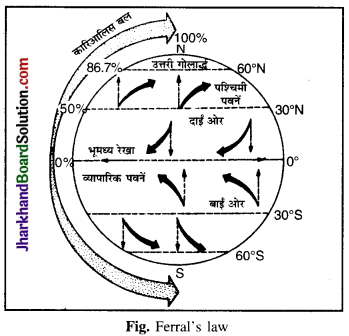
वायु की दिशा में परिर्वतन का कारण पृथ्वी की दैनिक गति है। जब हवाएं कम चाल वाले भागों से अधिक चाल वाले भागों की ओर आती हैं तो पीछे रह जाती हैं। इस विक्षेप शक्ति (Deffective Force) को कोरोलिस बल भी कहा जाता है।
![]()
प्रश्न 9.
वायुमण्डल का सामान्य परिसंचरण महासागरीय धाराओं की गति को कैसे प्रभावित करता है तथा ENSO घटना का वर्णन करें।
उत्तर:
वायुमण्डल का सामान्य परिसंचरण और उसका महासागरों पर प्रभाव- वायुमण्डल का सामान्य परिसंचरण के सन्दर्भ में प्रशान्त महासागर का गर्म या ठण्डा होना अत्यधिक महत्त्वपूर्ण है। मध्य प्रशान्त महासागर की गर्म जलधाराएं दक्षिणी अमेरिका के तट की ओर प्रवाहित होती हैं और पीरू की ठण्डी धाराओं का स्थान ले लेती हैं। पीरू के तट पर इन गर्म धाराओं की उपस्थिति एल-निनो कहलाता है। एल-निनो घटना का मध्य प्रशान्त महासागर और ऑस्ट्रेलिया के वायुदाब परिवर्तन से गहरा सम्बन्ध है। प्रशान्त महासागर पर बायुदाब में यह परिवर्तन दक्षिणी दोलन कहलाता है।
इन दोनों (दक्षिणी दोलन बदलाव व एल निनो) की संयुक्त घटना को ईएनएसओ (ENSO) के नाम से जाना जाता है। जिन वर्षों में ईएनएसओ (ENSO) शक्तिशाली होता है, विश्व में वृहत् मौसम सम्बन्धी भिन्नताएँ देखी जाती हैं। दक्षिण अमेरिका के पश्चिमी शुष्क तट पर भारी वर्षा होती है, ऑस्ट्रेलिया और कभी-कभी भारत अकालग्रस्त होते हैं तथा चीन में बाढ़ आती है। इन घटनाओं के ध्यानपूर्वक आकलन से संसार के अन्य भागों की मौसम सम्बन्धी भविष्यवाणी के रूप में इनका प्रयोग किया जाता है।
प्रश्न 10.
वायु राशि क्या होती है? पवन से यह किस प्रकार भिन्न है?
उत्तर:
वायु राशि वायुमण्डल का एक मोटा तथा विस्तृत भाग है जिसमें तापमान और आर्द्रता के लक्षण एक समान होते हैं। इस प्रकार वायुराशियों में एकरूपता का पाया जाना इसका मुख्य लक्षण है। एक वायु राशि में एक-दूसरे के ऊपर वायु की विभिन्न परतें होती हैं। इस प्रकार वायुमण्डल में पर्याप्त ऊँचाई तक एक विशाल वायु राशि में एकरूपता पाई जाती है। वायु राशि तथा वायु में कई प्रकार से भिन्नता पाई जाती है। वायु धरातल के समानान्तर चलती है तथा इसकी विभिन्न पर्तों में ताप एवं आर्द्रता में विभिन्नता पाई जाती है। वायु राशि में वायु धाराएं ऊपर उठती हैं तथा एक विशाल क्षेत्र में तापमान एवं आर्द्रता में समानता पाई जाती है।
प्रश्न 11.
स्रोत प्रदेश किसे कहते हैं? ध्रुवीय महाद्वीपीय स्रोत प्रदेशों का वर्णन करो
उत्तर:
धरातल के ऐसे समान क्षेत्र जहां वायु राशियों की उत्पत्ति होती है, स्रोत प्रदेश (Source Region) कहलाते हैं। यह प्रदेश पृथ्वी के धरातल पर विस्तृत क्षेत्र हैं जहां एक सम लक्षण पाए जाते हैं। ऐसे प्रदेश में एक सम धरातल तथा प्रति चक्रवातीय वायु व्यवस्था पाई जाती है। इस अवस्था में अपसारी वायु संचरण (Divergent) होता है। प्रायः स्रोत प्रदेश ध्रुवीय तथा उष्ण कटिबन्धीय क्षेत्र में पाए जाते हैं। शीतकाल में उत्तरी अमेरिका तथा यूरेशिया के ध्रुवीय प्रदेश बर्फ से ढके रहते हैं। यहां प्रति चक्रवात चलते हैं। वायु स्थिर तथा शुष्क होती है। तापमान तथा आर्द्रता में एकरूपता पाई जाती है।
प्रश्न 12.
विभिन्न प्रकार की वायु राशियों की उत्पत्ति, स्रोत के आधार पर वर्गीकरण करो
उत्तर:
संसार की विभिन्न राशियों के सुविधापूर्वक अध्ययन के लिए इनका वर्गीकरण आवश्यक है। उत्पत्ति, स्रोत के आधार पर वायु राशियां दो प्रकार की हैं-
- ध्रुवीय वायु राशियां (Polar Air Masses): वे वायु राशियां उच्च अक्षांशों में जन्म लेती हैं। ये ठण्डी तथा कम आर्द्र होती हैं ।
- उष्ण कटिबन्धीय वायु राशियां (Tropical Air Masses): ये वायु राशियां निम्न अक्षांशों में जन्म लेती हैं तथा इनमें तापक्रम व आर्द्रता अधिक होती है।
वायुराशियों को उत्पत्ति के आधार पर दो वर्गों में बांटा जा सकता है:
- समुद्री वायु राशियां (Maritime Air Masses): जो अधिक आर्द्र होती हैं।
- महाद्वीपीय वायु राशियां (Continental Air Masses ): जो प्रायः शुष्क होती हैं।
इस प्रकार वायु राशियों के चार प्रकार माने जाते हैं:
- समुद्री ध्रुवीय वायु राशियां।
- महाद्वीपीय ध्रुवीय वायु राशियां।
- समुद्री उष्ण कटिबन्धीय वायु राशियां|
- महाद्वीपीय उष्ण कटिबन्धीय वायु राशियां।
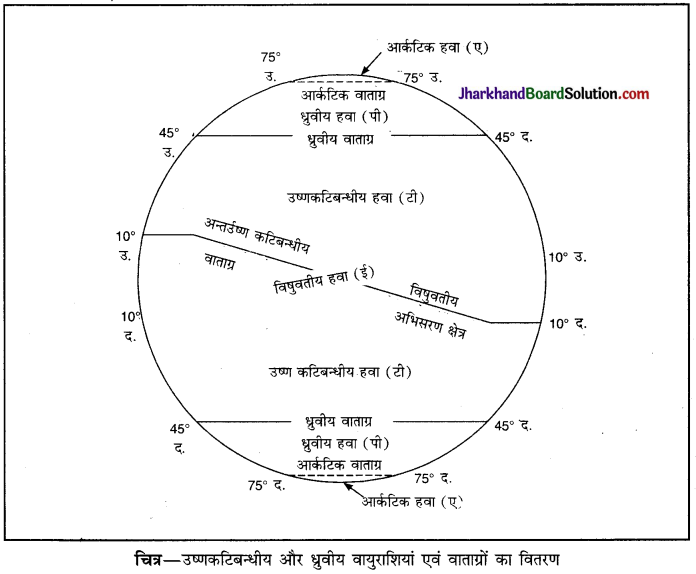
प्रश्न 13.
उत्तरी गोलार्द्ध में व्यापारिक पवनों की दिशा उत्तरी पूर्वी क्यों है? व्याख्या करें।
उत्तर:
व्यापारिक पवनें उपोष्ण उच्च वायुदाब पेटी से भूमध्य रेखीय निम्न दाब पेटी की ओर चलती हैं। उत्तरी गोलार्द्ध में इनकी दिशा उत्तर-पूर्वी होती है। यदि पृथ्वी स्थिर होती तो ये पवनें उत्तर-दक्षिण दिशा में चलतीं, परन्तु पृथ्वी की दैनिक गति के कारण ये पवनें लम्बवत् दिशा से हट कर एक ओर चली जाती हैं। उत्तरी गोलार्द्ध में विक्षेप शक्ति (Deflective force) दाईं ओर कार्य करती है। इसलिए ये पवनें दाईं ओर मुड़ जाती हैं। इस शक्ति को कोरोलिस बल भी कहा जाता है। इसी बल पर फैरल का सिद्धान्त आधारित है। इस सिद्धान्त के अनुसार ये पवनें उत्तरी गोलार्द्ध में दाईं ओर मुड़ जाती हैं तथा इनकी दिशा उत्तरी-पूर्वी हो जाती है।
![]()
प्रश्न 14.
चक्रवात किसे कहते हैं?
उत्तर:
चक्रवात न्यून वायुदाब की ऐसी व्यवस्था है जिसमें पवनें चारों ओर से केन्द्र की ओर चलती हैं। इस प्रकार चक्रवात न्यून वायुदाब के केन्द्र होते हैं जिनमें समदाब रेखाएं वृत्ताकार होती हैं। उत्तरी गोलार्द्ध में पवनों की दिशा घड़ी की सुइयों के विपरीत (Anti-clockwise) तथा दक्षिणी गोलार्द्ध में घड़ी की सुइयों के अनुसार (Clock-wise) होती है । चक्रवात उत्पत्ति क्षेत्र की दृष्टि से उष्ण कटिबन्धीय तथा शीत उष्ण कटिबन्धीय होते हैं।
प्रश्न 15.
उष्ण कटिबन्धीय चक्रवातों के प्रमुख गुणों का वर्णन करो।
उत्तर:
उष्ण कटिबन्धीय चक्रवात (Tropical Cyclones):
- ये चक्रवात 5° से 30° अक्षांशों के बीच व्यापारिक पवनों के साथ – साथ पूर्व से पश्चिम में चलते हैं।
- इनके केन्द्र में अत्यधिक निम्न दाब होता है तथा समदाब रेखाएं वृत्ताकार होती हैं।
- साधारणतः इनका आकार तथा विस्तार छोटा होता है। इसका व्यास 150 से 500 किलोमीटर तक होता है।
- चक्रवात के केन्द्रीय भाग को ‘आंधी की आंख’ (Eye of the Storm) कहते हैं। यह प्रदेश शान्त तथा वर्षाहीन होता है। यह गर्म वायु की धाराओं के रूप में ऊपर उठने से बनता है तथा इनकी ऊर्जा
- के स्रोत संघनन की गुप्त ऊष्मा है।
- शीत ऋतु की अपेक्षा ग्रीष्म ऋतु में इनका अधिक विकास होता है।
- इन चक्रवातों में हरीकेन तथा टाइफून बहुत विनाशकारी होते हैं।
- इन चक्रवातों द्वारा भारी वर्षा होती है।
प्रश्न 16.
उष्ण कटिबन्धीय चक्रवात इतने वृत्ताकार क्यों होते हैं?
उत्तर:
उष्ण कटिबन्धीय चक्रवात में समदाब रेखाएं वृत्ताकार होती हैं। केन्द्र में अत्यधिक निम्न दाब होता है। इनकी उत्पत्ति दो विभिन्न गुणों वाली वायु राशियों के मिलने के कारण होती है। परन्तु तीव्र हवाओं के कारण इन वायु राशियों के सीमान्त प्रदेश समाप्त हो जाते हैं। एक चक्रधार वायु व्यवस्था उत्पन्न हो जाती है जिसके चारों ओर अधिक वायुदाब होता है। यह वायुदाब समान रूप से बढ़ता है इसलिए ये चक्रवात वृत्ताकार होते हैं।
प्रश्न 17.
उष्ण कटिबन्धीय चक्रवातों में भारी वर्षा कैसे होती है?
उत्तर:
चक्रवात के केन्द्रीय भाग में पवनें नीचे उतरती हैं। इसलिए यह भाग शान्त तथा वर्षाहीन होता है। अन्य भागों दाब प्रवणता काफ़ी तीव्र होती है तथा तेज़ हवाएं चलती हैं। चारों ओर से ऊपर उठती हुई पवनों में संघनन की क्रिया से घनघोर वर्षा होती है। ये चक्रवात महासागर में उत्पन्न होते हैं इसलिए नमी से भरपूर होने के कारण अधिक वर्षा करते हैं।
प्रश्न 18.
उष्ण कटिबन्धीय चक्रवातों का प्रभाव विनाशकारी क्यों होता है?
उत्तर:
उष्ण कटिबन्धीय चक्रवात निम्न दाब के केन्द्र होते हैं। अतः बाहर से तीव्र हवाएं भीतर आती हैं। इनकी गति लगभग 200 कि० मी० प्रति घण्टा होती है। ये चक्रवात महासागरों पर बिना रोक-टोक के चलते हैं। समुद्र में ऊंची- ऊंची लहरें होती हैं जिससे समुद्री जहाज़ों को हानि होती है। समुद्री तटों पर छोटे-छोटे द्वीपों पर भयंकर लहरें अपार धन-जन की हानि करती हैं हज़ारों लोग समुद्र में डूब जाते हैं। समुद्री यातायात ठप्प हो जाता है। डैल्टा क्षेत्रों में ऊंची लहरों से भारी हानि होती है। सन् 1970 में बांग्ला देश में ऐसे ही चक्रवात से धन-जन की भारी हानि हुई थी।
![]()
प्रश्न 19.
उष्ण कटिबन्धीय चक्रवातों के क्षेत्रों का वर्णन करो।
उत्तर:
ये चक्रवात भिन्न-भिन्न सागरों में विभिन्न नामों से प्रसिद्ध हैं। खाड़ी बंगाल में इन्हें चक्रवात (Depression), पश्चिमी द्वीप समूह में हरीकेन (Huricane), चीन सागर में टाइफून (Typhoon) तथा अन्ध महासागर में टारनेडोज़. (Tornadoes) कहते हैं। ऑस्ट्रेलिया में विली – विली ( Willy-Willy) कहते हैं।
प्रश्न 20.
उष्ण कटिबन्धीय चक्रवात तथा शीतोष्ण कटिबन्धीय चक्रवातों में अन्तर स्पष्ट करो
उत्तर:
| उष्ण कटिबन्धीय चक्रवात (Tropical Cyclones) | शीतोष्ण कटिबन्धीय चक्रवात (Temperate Cyclones) |
| 1. स्थिति-यह चक्रवात उष्ण कटिबन्ध में 5° से 3°अक्षांश तक चलते हैं। | 1. यह चक्रवात शीतोष्ण कटिबन्ध में 35° से 65° अक्षांश तक चलते हैं। |
| 2. दिशा-यह व्यापारिक पवनों के साथ-साथ पूर्व से पश्चिम की ओर चलते हैं। | 2. यह पश्चिमी पवनों के साथ-साथ पश्चिम से पूर्व की ओर चलते हैं। |
| 3. विस्तार-इनका व्यास 150 से 500 कि० मी० तक होता है। | 3. इनका व्यास 1000 कि० मी० से अधिक होता है। |
| 4. आकार-यह वृत्ताकार होते हैं। | 4. यह प्राय: V आकार के होते हैं। |
| 5. उत्पत्ति-यह संवाहिक धाराओं के कारण जन्म लेते हैं। | 5. यह उष्ण तथा शीत वायु के मिलने से जन्म लेते हैं। |
| 6. गति-इनमें वायु गति 100-200 कि० मी० प्रति घण्टा होती है। | 6. इनमें वायु गति 30-40 कि० मी० प्रति घण्टा होती है। |
| 7. रचना-यह प्राय: ग्रीष्मकाल में उत्पन्न होते हैं। इसके केन्द्रीय भाग को आंधी की आंख कहा जाता है। | 7. यह प्राय: शीतकाल में उत्पन्न होते हैं। इसमें दो भाग उष्ण वाताग्र तथा शीत वाताग्र होते हैं। |
| 8. मौसम-इसमें थोड़े समय के लिए तेज़ हवाएं चलती हैं तथा भारी वर्षा होती है। | 8. इसमें शीत लहर चलती है तथा कई दिनों तक थोड़ीथोड़ी वर्षा होती रहती है। |
निबन्धात्मक प्रश्न (Essay Type Questions)
प्रश्न 1.
वायुमण्डलीय दाब से क्या अभिप्राय है? वायुदाब किन तत्त्वों पर निर्भर करता है?
उत्तर:
वायुमण्डलीय दाब (Atmospheric Pressure ):
वायुमण्डल पृथ्वी के धरातल पर पृथ्वी की गुरुत्वाकर्षण शक्ति के कारण टिका है। गुरुत्वाकर्षण शक्ति के कारण प्रत्येक वस्तु में भार होता है। वायु में भी एक घनफुट में 1.2 औंस भार होता है। इस भार के कारण पृथ्वी के धरातल पर दबाव पड़ता है। वायुमण्डलीय दाब का अर्थ है किसी भी स्थान पर वहां की हवा की उच्चतम सीमा के स्तम्भ का भार।
सामान्य वायुदाब (Normal Atmosphere Pressure ):
समुद्र तल पर प्रति वर्ग इंच पर वायुमण्डल का दबाव 6.68 किलोग्राम या 1.03 किलोग्राम प्रति वर्ग सेंटीमीटर होता है। वायुमण्डल का औसत या सामान्य दाब 45° अक्षांश पर समुद्र तल पर 29.92 इंच या 76 सेंटीमीटर या 1013.2 मिली बार होता है।
मिलीबार (Millibar):
एक वर्ग सें० मी० पर एक ग्राम भार के बल को एक मिलीबार कहते हैं। दूसरे शब्दों में 1000 डाइन (Dynes) प्रति वर्ग से० मी० के वायु भार को एक मिलीबार कहते हैं। वायुदाब मापने की इकाई मिलीबार तथा पास्कल है। व्यापक रूप से प्रयोग किए जाने वाली इकाई किलो पास्कल है जिसे hpa लिखते हैं। 1000 मिलीबार के वायुभार को एक बार (Bar) कहते हैं।
विभिन्न माप इकाइयों में सम्बन्ध:
30 इंच वायुदाब = 76 से० मी० = 1013.2 मिलीबार
1 इंच वायुदाब = 34 मिलीबार
1 सें०मी० वायुदाब = 13.3 मिलीबार
वायुदाब को प्रभावित करने वाले तत्त्व:
1. तापमान (Temperature ):
गर्म होने पर वायु फैल कर हल्की हो जाती है। ठण्डी वायु सिकुड़ कर भारी हो जाती है। इसलिए यदि तापमान अधिक होगा तो वायु दबाव कम होगा। यदि तापमान कम होगा तो वायु दबाव अधिक होगा जैसे कहा जाता है कि ” A rising thermometer shows a falling barometer.” यही कारण है कि दिन को कम तथा रात को अधिक वायु दबाव होता है।
2. ऊँचाई (Altitude):
वायु की ऊपरी सतहों का भार निचली सतह पर पड़ता है। नीचे की हवा भारी तथा घनी हो जाती है। ऊपर जाने पर प्रत्येक 300 मीटर की ऊँचाई पर वायु दबाव 1 इंच या 34 मिलीबार गिर जाता है। प्रत्येक दस मीटर की ऊंचाई पर 1 hpa (किलो पास्कल) वायुदाब घटता है। अनुमान है कि वायुमण्डल का आधा दबाव केवल 5000 मी० की ऊँचाई तक सीमित है।
3. जलवाष्प (Water Vapour ):
जलवाष्प वायु की अपेक्षा हल्का होता है, इसलिए शुष्क वायु नम वायु की अपेक्षा भारी होती है। यही कारण है कि स्थलीय पवनें (Land Winds) शुष्क होने के कारण समुद्री पवनों (Sea Winds) की अपेक्षा भारी होती हैं।
4. दैनिक गति (Rotation ):
पृथ्वी की दैनिक गति के कारण कई स्थानों पर वायु इकट्ठी होती है तथा दूसरे स्थानों पर वायु दबाव कम हो जाता है। 60° अक्षांश पर कम वायु दबाव पृथ्वी की दैनिक गति के ही कारण है।
![]()
प्रश्न 2.
समदाब रेखाएं क्या होती हैं? इनकी विशेषताएं बताओ।
अथवा
मौसम मानचित्र बनाते समय किसी स्थान के वायुदाब को समुद्र तल तक क्यों घटाया जाता है?
उत्तर:
समदाब रेखाएं (Isobars) – Iso शब्द का अर्थ है:
समान और Bar का अर्थ है – दाब । इसलिए Isobars का अर्थ है – समदाब रेखाएं (Lines of Equal Pressure) “Isobars are lines joining the places of same pressure reduced to sea level.” (धरातल पर समान वायु दबाव वाले स्थानों को मिलाने वाली रेखाओं को समदाब रेखाएं कहते हैं।) इस वायु दबाव को समुद्र – तल पर घटा कर दिखाया जाता है। ऊँचाई के प्रभाव को वायु दबाव में से घटा लेते हैं। यह कल्पना की जाती है कि सभी स्थान समुद्र – तल पर स्थित हैं। यदि कोई स्थान 300 मीटर ऊँचा है और उसका वास्तविक वायु दबाव 900 मिलीबार है तो उसका समुद्र तल पर वायु दबाव = 900 + 34 = 934 मिलीबार होगा क्योंकि प्रति 300 मीटर पर 34 मिलीबार वायु दबाव कम हो जाता है।
विशेषताएं (Characteristics):
- ये रेखाएं पूर्व – पश्चिम दिशा में फैली हुई होती हैं।
- ये दक्षिणी गोलार्द्ध में अक्षांश रेखाओं के लगभग समानान्तर हैं।
- ये रेखाएं अधिक दबाव से कम दबाव की ओर खींची जाती हैं।
- ये रेखाएं समुद्र पर स्थल की अपेक्षा अधिक नियमित (Regular) होती हैं।
- जलवायु मानचित्रों में वायुभार समदाब रेखाओं से दिखाया जाता है।
- इससे पवन की दिशा व गति का पता चलता है।
प्रश्न 3.
व्यापारिक तथा पश्चिमी पवनें क्या होती हैं? इनके विस्तार तथा दिशा का वर्णन करो। ये कैसे उत्पन्न होती हैं तथा अपनी दिशा क्यों बदलती हैं? इनके प्रभाव का वर्णन करो।
उत्तर:
स्थायी पवनें (Planetary Winds):
धरातल पर उच्च वायु दबाव तथा कम वायु दबाव की विभिन्न स्थायी पेटियां (Belts) मिलती हैं। उच्च वायु भार पेटियों की ओर से कम वायु भार की ओर निरन्तर पवनें चलती हैं। इन्हें स्थायी पवनें कहते हैं। ये सदा एक ही दिशा में चलती हैं। स्थायी पवनें तीन प्रकार की हैं
- व्यापारिक पवनें (Trade Winds)
- प्रतिकूल व्यापारिक या पश्चिमी पवनें (Westerlies)
- ध्रुवीय पवनें (Polar Winds)
1. व्यापारिक पवनें (Trade Winds):
विस्तार (Extent): व्यापारिक पवनें वे स्थायी पवनें हैं जो उष्ण कटिबन्ध (Tropics) के बीच भूमध्य रेखा की ओर चलती हैं। ये पवनें अश्व अक्षांशों (Horse Latitudes) या उपोष्ण कटिबन्धीय उच्च दबाव (Sub- Tropical High Pressure) के क्षेत्र से डोलड्रमस् (Doldrums) भूमध्य रेखा की कम वायु दबाव पेटी की ओर चलती हैं। इनका विस्तार प्रायः 5°—35° उत्तर तथा दक्षिण तक चला जाता है।
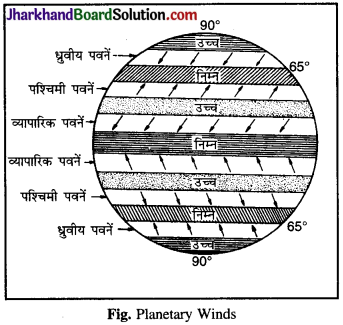
दिशा (Direction): ये पवनें दोनों गोलाद्ध में पूर्व से आती हुई प्रतीत होती हैं। इसलिए इन्हें पूर्वी पवनें (Easterlies) भी कहते हैं। उत्तरी गोलार्द्ध में इनकी दिशा उत्तरी-पूर्वी (North-East) तथा दक्षिणी गोलार्द्ध में दक्षिण- पूर्वी (South-East) होती है।
नाम का कारण (Why so called?): इन पवनों को Trade Winds अर्थात् व्यापारिक पवनें कहने के दो कारण
- प्राचीन काल में यूरोप तथा अमेरिका के बीच बादबानी जहाज़ों को इन पवनों से बहुत सहायता मिलती थी ये पवनें Backing winds के रूप में जहाज़ों की गति बढ़ा देती थीं, इसलिए व्यापार में सहायक होने के कारण इन्हें व्यापारिक पवनें कहा जाता है।
- अंग्रेज़ी के मुहावरे ‘To blow trade’ का अर्थ है निरन्तर चलना ये पवनें लगातार एक ही दिशा में चलती हैं इसलिए इन्हें Trade winds या Track winds कहते हैं।
उत्पत्ति का कारण (Why caused):
भूमध्य रेखा पर अधिक गर्मी के कारण कम वायु दबाव पेटी मिलती है। भूमध्य रेखा से ऊपर उठने वाली गर्म तथा हल्की वायु 30° उत्तर तथा दक्षिण के पास ठण्डी तथा भारी होकर नीचे उतरती रहती है। ध्रुवों से खिसक कर आने वाली वायु भी अक्षांशों में नीचे उतरती है । इन उतरती हुई पवनों के कारण कर्क रेखा तथा मकर रेखा के निकट उच्च वायु दबाव पेटी बन जाती है। इसलिए भूमध्य रेखा के न्यून वायु दबाव (Low Pressure) का स्थान ग्रहण करने के लिए 30° उत्तर तथा दक्षिण के उच्च वायुदाब से भूमध्य रेखा की ओर व्यापारिक पवनें चलती हैं।
दिशा परिवर्तन का कारण (Change in Direction):
यदि पृथ्वी स्थिर होती तो ये पवनें उत्तर दिशा में चलतीं परन्तु पृथ्वी की दैनिक गति के कारण ये पवनें इस लम्बवत् दिशा से हट कर एक ओर झुक जाती हैं अर्थात् परे (Deflect) हो जाती हैं। फैरल के नियम (Ferral’s Law) तथा कोरोलिस बल के कारण ये पवनें उत्तरी गोलार्द्ध में दाईं ओर तथा दक्षिणी गोलार्द्ध में बाईं ओर मुड़ जाती हैं।
प्रभाव (Effects):
- गर्म प्रदेशों की ओर चलने के कारण ये पवनें प्रायः शुष्क होती हैं।
- ये पवनें महाद्वीपों के पूर्वी भागों में वर्षा करती हैं तथा पश्चिमी भागों तक पहुंचते-पहुंचते शुष्क हो जाती हैं। यही कारण है कि पश्चिमी भागों में 20° – 30° में उष्ण मरुस्थल (Hot Deserts) मिलते हैं।
- ये पवनें उत्तरी भाग में उच्च दबाव (High Pressure) के निकट होने के कारण ठण्डी (Cool) तथा शुष्क (Dry) होती हैं। परन्तु भूमध्य रेखा के निकट दक्षिणी भागों में गर्म (Hot) तथा आर्द्र (Wet) होती हैं।
- ये पवनें समुद्रों पर निरन्तर तथा धीमी गति से चलती हैं। परन्तु महाद्वीपों पर इनकी दिशा व गति में अन्तर पड़ जाता है।
2. पश्चिमी पवनें (Westerlies):
विस्तार (Extent): ये पवनें वे स्थायी पवनें हैं जो शीतोष्ण (Temperate) खण्ड में 35° के उच्च वायु दबाव से 60° के उपध्रुवीय न्यून वायु दबाव (Subpolar Low Pressure) की ओर चलती हैं। इनका विस्तार प्राय: 35° से 65° तक पहुंच जाता है। इन पवनों की उत्तरी सीमा ध्रुवीय सीमान्त ( Polar Fronts) तथा चक्रवातों (Cyclones) के कारण सदा बदलती रहती है।
दिशा (Direction):
उत्तरी गोलार्द्ध में इन पवनों की दिशा दक्षिण-पश्चिमी ( South-West) होती है। दक्षिणी गोलार्द्ध में इन पवनों की दिशा उत्तर-पश्चिमी (North-West) होती है।
नाम का कारण (Why so called ):
दोनों गोलाद्धों में ये पवनें पश्चिम से आती हुई प्रतीत होती हैं। इसलिए इन्हें पश्चिमी पवनें कहते हैं। इनकी दिशा व्यापारिक पवनों के विपरीत होती है। इसलिए उन्हें प्रतिकूल व्यापारिक पवनें (Anti-Trade Winds) भी कहते हैं।
उत्पत्ति का कारण (Why caused?):
कर्क रेखा तथा मकर रेखा के निकट नीचे उतरती हुई पवनों (Descending Winds) के कारण उच्च वायु दबाव हो जाता है। भूमध्य रेखा से गर्म तथा हल्की वायु इन अक्षांशों से नीचे उतरती रहती है। इस प्रकार ध्रुवों से खिसक कर आने वाली वायु भी यहां उतरती है। परन्तु 60° अक्षांश के निकट Arctic circle तथा Antarctic circle पर पृथ्वी की दैनिक गति के कारण कम वायु दबाव हो जाता है। इसलिए 30° के उच्च वायु दबाव की ओर से 60° के कम वायु दबाव की ओर पश्चिमी पवनें चलती हैं।
दिशा परिवर्तन (Change in Direction ):
साधारणतया पवनों की दिशा उत्तर-दक्षिण होनी चाहिए, परन्तु पृथ्वी की दैनिक गति के कारण ये पवनें लम्बवत् दिशा से हटकर एक ओर झुक जाती हैं। फैरल के नियम (Ferral’s law) के अनुसार उत्तरी गोलार्द्ध में दाईं ओर तथा दक्षिणी गोलार्द्ध में बाईं ओर मुड़ जाती हैं।
प्रभाव (Effects):
1. समुद्रों की नमी से लदी होने के कारण ये पवनें अधिक वर्षा करती हैं।
2. ये पवनें पश्चिमी प्रदेशों में बहुत वर्षा करती हैं, परन्तु पूर्वी भाग शुष्क रह जाते हैं।
3. ये पवनें बहुत अस्थिर होती हैं । इनकी दिशा तथा शक्ति बदलती रहती है।चक्रवात (Cyclones) तथा प्रति- चक्रवात (Anti-Cyclones) इनके मार्ग में अनिश्चित मौसम ले आते हैं । वर्षा, बादल, कोहरा, बर्फ़ तथा तेज़ आंधियों के कारण मौसम लगातार बदलता रहता है।
4. यह दक्षिणी गोलार्द्ध में समुद्रों पर निरन्तर तथा तीव्र गति से चलती हैं। 40° – 50° दक्षिण के अक्षांशों में इन्हें गर्जता चलीसा (Roaring Forties) भी कहा जाता है। 50° – 60° दक्षिण में इन्हें प्रचण्ड पछुआ Furious Fifties तथा Shrieking Sixties कहते हैं। इन प्रदेशों में ये इतनी तेज़ी से चलती हैं कि दक्षिणी अमेरिका के सिरे (Cape Horn) पर समुद्री यातायात बन्द हो जाता है।
5. व्यापारिक पवनों की अपेक्षा इनका प्रवाह क्षेत्र बड़ा होता है।
![]()
प्रश्न 4.
निम्नलिखित स्थानीय पवनों का विस्तार – पूर्वक वर्णन करो-
1. स्थल तथा जल समीर।
2. पर्वतीय तथा घाटी पवनें।
3. चिनूक तथा फोएन पवनें।
उत्तर:
1. स्थल तथा जल समीर (Land and Sea Breezes):
धरातल पर स्थानीय पवनों का क्रम है। परन्तु जल तथा स्थल में तापमान की विभिन्नता के कारण कुछ स्थानीय पवनें जन्म लेती हैं। जल – समीर व स्थल – समीर वे अस्थायी पवनें हैं जो समुद्र तटीय प्रदेशों में अनुभव की जाती हैं। ये जल तथा स्थल की असमान गर्मी के कारण उत्पन्न होती हैं। इसलिए इन्हें छोटे पैमाने पर मानसून पवनें (Monsoons on a small scale) भी कहते हैं।
तीव्र गर्मी से स्थल भाग समुद्र की अपेक्
(क) जल समीर (Sea Breeze):
ये वे पवनें हैं जो दिन के समय समुद्र की ओर चलती हैं। उत्पत्ति के कारण (Origin) दिन के समय सूर्य की तीव्र गर्मी से स्थल भाग समुद्र की अपेक्षा अधिक तथा जल्दी गर्म हो जाता है। स्थल पर वायु गर्म होकर ऊपर उठती है तथा कम वायु दबाव हो जाता है, समुद्र पर स्थल की अंपेक्षा अधिक वायु दबाव रहता है। इस प्रकार स्थल के कम दबाव का स्थान लेने के लिए समुद्र की ओर से ठण्डी पवनें चलती हैं। स्थल की गर्म वायु ऊपर उठकर समुद्र की ओर चली जाती है। इस प्रकार वायु के चलने का संवहन चक्र बन जाता है।
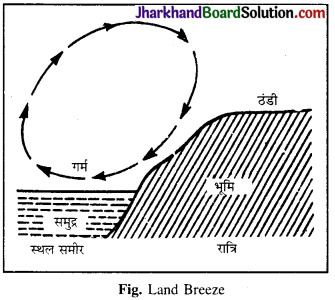
प्रभाव (Effects):
- जल – समीर ठण्डी तथा सुहावनी (Cool and Fresh) होती ह।
- गर्मियों में तटीय भागों के तापक्रम को कम करती है, परन्तु सर्दियों में तटीय भागों के तापक्रम को ऊंचा करती है। इस प्रकार मौसम सुहावना तथा समान हो जाता है।
- इनका प्रभाव समुद्र तट से 33 कि० मी० की दूरी तक सीमित रहता है।
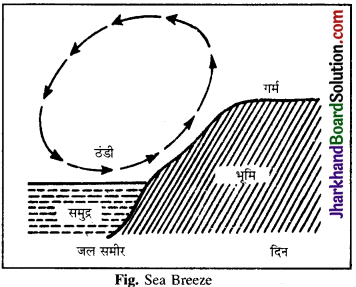
(ख) स्थल समीर (Land Breeze ): ये वे पवनें हैं जो रात के समय स्थल से समुद्र की ओर चलती हैं।
उत्पत्ति का कारण (Origin):
रात की स्थिति दिन विपरीत होती है। स्थल भाग समुद्र की अपेक्षा अधिक तथा जल्दी ठण्डे हो जाते हैं। समुद्र पर वायु दबाव कम हो जाता है। परन्तु स्थल पर अधिक वायु दबाव होता है। इस प्रकार स्थल की ओर से समुद्र की ओर पवनें चलती हैं। समुद्र की गर्म वायु ऊपर उठकर स्थल पर उतरती है जिससे वायु चलने का क्रम पूरा हो जाता है।
प्रभाव (Effects):
- इनका स्थल भागों पर कोई विशेष प्रभाव नहीं होता।
- इन पवनों का लाभ उठाकर मछली पकड़ने वाले प्रात: काल स्थल समीर (Land Breeze) की सहायता से समुद्र की ओर बढ़ जाते हैं तथा सायंकाल को जल- समीर (Sea Breeze) के साथ-साथ तट की ओर वापस आ जाते हैं।
- इनका प्रभाव तभी अनुभव होता है जबकि आकाश साफ हो, दैनिक तापान्तर अधिक हो तथा तेज़ पवनों का अभाव हों।
2. पर्वतीय तथा घाटीय पवनें (Mountain and Valley Winds): ये पवनें साधारणतया दैनिक पवनें हैं जो दैनिक तापान्तर के फलस्वरूप वायु दबाव की विभिन्नता के कारण चलती हैं।
(क) पर्वतीय पवनें (Mountain Winds0): पर्वतीय प्रदेश में रात के समय पर्वत के शिखर से घाटी की ओर ठण्डी और भारी वायु बहती है जिसे पर्वतीय पवनें (Mountain Winds) कहते हैं।
उत्पत्ति ( Origin):
रात के समय तीव्र विकिरण (Rapid radiation) के कारण वायु ठण्डी तथा भारी हो जाती है। यह वायु गुरुत्वाकर्षण शक्ति (Gravity) के कारण ढलानों से होकर नीचे उतरती है। इसे वायु प्रवाह (Air Drainage) भी कहते हैं। इन्हें अवरोही पवनें (Katabatic Winds) भी कहते हैं।
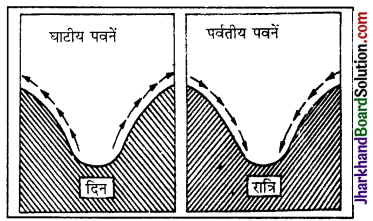
प्रभाव (Effects): इन पवनों के कारण घाटियां (Valleys ) ठण्डी वायु से भर जाती हैं जिससे घाटी के निचले भाग पर पाला पड़ता है। इसलिए कैलीफोर्निया (California) में फलों के बाग तथा ब्राज़ील में कहवा के बाग ढलानों पर लगाए जाते हैं।
(ख) घाटीय पवनें (Valley Winds ): दिन के समय घाटी की गर्म वायु ढाल से होकर शिखर की ओर ऊपर चढ़ती है। इसे घाटीय पवनें (Valley Winds) कहते हैं।
उत्पत्ति (Origin):
दिन के समय पर्वत के शिखर पर तीव्र गर्मी तथा विकिरण के कारण वायु गर्म होकर ऊपर उठती है तथा वायु दबाव कम हो जाता है। उसका स्थान लेने के लिए घाटी से हवाएं ऊपर चढ़ती हैं। ज्यों-ज्यों पवनें ऊपर चढ़ती हैं, ठण्डी होती जाती हैं। इन्हें आरोही पवनें (Anabatic winds) भी कहते हैं।
प्रभाव (Effects):
- ऊपर चढ़ने के कारण ये पवनें ठण्डी होकर घनघोर वर्षा करती हैं।
- ये ठण्डी पवनें गहरी घाटियों में गर्मी की तीव्रता को कम करती हैं।
3. चिनूक तथा फोएन पवनें (Chinook and Foehn Winds):
उत्पत्ति (Origin):
ये गर्म तथा शुष्क पवनें हैं। ये पवनें पर्वतों के सम्मुख ढाल पर टकराकर ऊपर चढ़ती हैं। इस क्रिया के कारण ये ठण्डी होकर पवन के सामने वाले ढाल (Windward slope ) पर काफ़ी वर्षा करती हैं। फिर ये पवनें पर्वत के विपरीत ढाल पर नीचे उतरती हैं। ये नीचे उतरती हुई पवनें (Descending Winds) दबाव से गर्म तथा शुष्क हो जाती हैं तथा वर्षा नहीं करतीं। मैदानी भागों में उतर कर उनका तापमान बढ़ा देती हैं।
(क) चिनूक पवनें ( Chinook Winds):
अमेरिका में रॉकीज (Rockies) पर्वतों को पार करके प्रेयरी के मैदान में चलने वाली ऐसी पवनों को चिनूक (Chinook) पवनें कहते हैं। चिनूक का अर्थ है – बर्फ खाऊ (Snow Eater) क्योंकि ये पवनें अधिक तापक्रम के कारण बर्फ को पिघला देती हैं । कई बार 24 घण्टों के समय में 50°F (10° C ) तापमान बढ़ जाता है
(ख) फोएन पवनें (Foehn Winds ):
यूरोप में एल्पस (Alps) को पार करके स्विट्ज़रलैण्ड में उतरने वाली पवनों को फोएन (Foehn) पवनें कहते हैं।
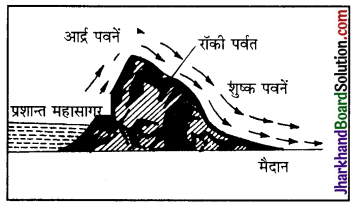
प्रभाव (Effects):
- ये पवनें तापमान बढ़ा देती हैं जिससे बर्फ पिघल जाती है और फसलों के पकने में सहायता मिलती है।
- ये पवनें शीतकाल की कठोरता को कम करती हैं।
- बर्फ के पिघल जाने से पहाड़ी चरागाह सारा साल खुले रहते हैं तथा पशु-पालन की सुविधा रहती है।
![]()
प्रश्न 5.
शीतोष्ण चक्रवात कैसे निर्मित होते हैं ? इनकी मुख्य विशेषताओं का वर्णन करो।
उत्तर:
शीतोष्ण चक्रवात ( Temperate Cyclones): ये चक्रवात पश्चिमी पवनों के क्षेत्र में 350 से 650 अक्षांशों के बीच तरंगों की तरह जन्म लेते हैं तथा पश्चिम से पूर्व दिशा में आगे बढ़ते हैं।
शीतोष्ण चक्रवातों की उत्पत्ति दो प्रकार से होती है
- धरातलीय अग्र ( Surface Front ) की अस्थिर पवनों से।
- उच्च-वायु (Upper Air) द्रोणी के नीचे की ओर प्रसार से।
इन चक्रवातों की उत्पत्ति के विषय में ध्रुवीय सीमान्त सिद्धान्त (Polar Front Theory ) प्रस्तुत किया गया है। इस सिद्धान्त के अनुसार चक्रवात की उत्पत्ति दो भिन्न तापमान वाली वायु राशियों के मिलने से होती है। इस सिद्धान्त के अनुसार चक्रवात के जीवन के इतिहास में अवस्थाओं का एक क्रम देखा जा सकता है:
- पहली अवस्था: इस अवस्था में दो वायु राशियां एक-दूसरे के निकट आती हैं तथा अग्र (front ) की रचना होती है। ध्रुवों की तरफ से शीतल वायु राशि तथा भू-मध्य रेखा की ओर से गर्म वायु विपरीत दिशाओं में आती है।
- दूसरी अवस्था: इस अवस्था में उष्ण वायु राशि में एक उभार उत्पन्न हो जाता है तथा अग्र एक तरंग का रूप धारण कर लेता है। अग्र के दो भाग हो जाते हैं- उष्ण अग्र तथा शीतल अग्र । गर्म वायु राशि उष्ण उग्र (Warm
front) की शीतल वायु से टकराती है। - तीसरी अवस्था: इस अवस्था में शीतल अग्र तेज़ी से आगे बढ़ता है। तरंगों की ऊँचाई तथा वेग में वृद्धि हो जाती है। गर्म वायु राशि का भाग छोटा हो जाता है।
- चौथी अवस्था: इस अवस्था में तरंगों की ऊँचाई अधिकतम हो जाती है। दोनों वायु राशियों में धाराएं वृत्ताकार गति प्राप्त कर लेती हैं तथा चक्रवात का विकास होता है।
- पांचवीं अवस्था: इस अवस्था में शीतल अग्र उष्ण अग्र को पकड़ लेता है। शीतल वायु उष्ण वायु को धरातल पर दबा देती है।
- अन्तिम अवस्था: इस अवस्था में उष्ण वायु अपने स्रोत से हट कर ऊपर उठ जाती है धरातल पर एक शीतल वायु का विशाल भंवर (whirl) चक्रवात का निर्माण करता है
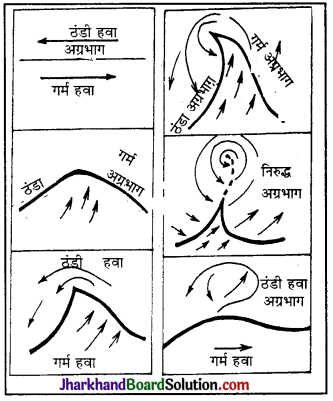
शीतोष्ण चक्रवात की मुख्य विशेषताएं:
- ये चक्रवात पश्चिमी पवनों के क्षेत्र में 35° से 65° के अक्षांश के बीच पश्चिम पूर्व दिशा में चलते हैं।
- साधारणतः ये वृत्ताकार होते हैं परन्तु कुछ चक्रवात ‘V’ आकार के होते हैं।
- इनकी लम्बवत् मोटाई 9 से 11 किलोमीटर तथा व्यास 1000 किलोमीटर चौड़ा होता है।
- चक्रवात में अभिसारी पवनें केन्द्र में वायु को ऊपर उठा देती हैं। इसके परिणामस्वरूप मेघों का निर्माण तथा वर्षा होती है।
- साधारणतः इनकी गति 50 किलोमीटर प्रति घण्टा होती है। ग्रीष्म ऋतु की अपेक्षा शीतकाल में इनकी गति अधिक होती है।
- इसकी संरचना में दो अग्र (Fronts ), दो खण्ड (Sectors) तथा चार वृत्तपाद (Quadrants) होते हैं। उष्ण अग्र दक्षिणी-पूर्वी वृत्तपाद में होता है जबकि शीतल अग्र दक्षिणी-पश्चिमी वृत्तपाद में होता है।

